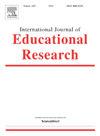教师在公民教育中的感知专业能力:在欧洲背景下为职前教师开发和验证一项调查工具
IF 2.5
3区 教育学
Q1 EDUCATION & EDUCATIONAL RESEARCH
引用次数: 0
摘要
全球危机正在重塑西方民主,并对其基础施加压力。公民教育作为解决方案的一部分正日益得到推广,因为它有可能支持年轻人成为积极、参与、知情和负责任的民主公民。因此,所有教师都必须具备在课堂上解决公民问题的专业性。本研究以比利时法兰德斯为样本,旨在开发一套有效且可靠的职前教师专业公民教育(CE)能力测评工具。项目的制定以欧洲政策建议为指导。采用探索性和验证性因素分析(n = 1829),确定了五个感知的专业文化教育能力量表:职前教师(1)创造开放课堂氛围的意愿,(2)讨论政治话题的意愿,(3)感知解决社会话题的重要性,(4)感知学生的社会和经济背景如何影响教学实践,以及(5)感知教学文化教育的准备。这些量表显示了令人满意的心理测量特性,并建立了收敛效度和发散效度。经过验证的仪器在欧洲范围内提供了几种实际应用。在职前水平,它可以用来评估初级教师教育计划在培养职前教师的CE能力方面的有效性,并支持机构问责制和对国家和欧洲CE标准的遵守。在在职层面,该工具可以作为一种自我评估工具,以确定专业发展需求并评估自我教育干预措施的影响。它还可以比较不同欧洲国家和地区教师的专业CE能力。本文章由计算机程序翻译,如有差异,请以英文原文为准。
Teachers’ perceived professional competences in citizenship education: Developing and validating a survey instrument for pre-service teachers in a European context
Global crises are reshaping Western democracies and putting pressure on their foundations. Citizenship education (CE) is increasingly being promoted as part of the solution, as it has the potential to support young people in becoming active, engaged, informed, and responsible democratic citizens. Therefore it is crucial for all teachers to possess the professionalism to address citizenship issues in class. This study aimed to develop a psychometrically valid and reliable instrument to measure pre-service teachers’ perceived professional citizenship education (CE) competences, using a sample from Flanders, Belgium. The item development was guided by European policy recommendations. Using exploratory and confirmatory factor analyses (n = 1829), five perceived professional CE competences scales were identified: pre-service teachers’ (1) willingness to create an open classroom climate, (2) willingness to address political topics, (3) perceived importance of addressing social topics, (4) perceptions of how students’ social and economic background influences teaching practices, and (5) perceived preparedness for teaching CE. These scales demonstrated satisfactory psychometric properties, and both convergent and divergent validity were established. The validated instrument offers several practical applications in the European context. At the pre-service level, it can be employed to assess the effectiveness of initial teacher education programs in developing pre-service teachers’ CE competences, and to support institutional accountability and compliance with national and European CE standards. At the in-service level, the instrument can serve as a self-assessment tool to identify professional development needs and evaluate the impact of CE interventions. It also allows teachers’ perceived professional CE competences to be compared across different European countries and regions.
求助全文
通过发布文献求助,成功后即可免费获取论文全文。
去求助
来源期刊

International Journal of Educational Research
EDUCATION & EDUCATIONAL RESEARCH-
CiteScore
6.20
自引率
3.10%
发文量
141
审稿时长
21 days
期刊介绍:
The International Journal of Educational Research publishes regular papers and special issues on specific topics of interest to international audiences of educational researchers. Examples of recent Special Issues published in the journal illustrate the breadth of topics that have be included in the journal: Students Perspectives on Learning Environments, Social, Motivational and Emotional Aspects of Learning Disabilities, Epistemological Beliefs and Domain, Analyzing Mathematics Classroom Cultures and Practices, and Music Education: A site for collaborative creativity.
 求助内容:
求助内容: 应助结果提醒方式:
应助结果提醒方式:


